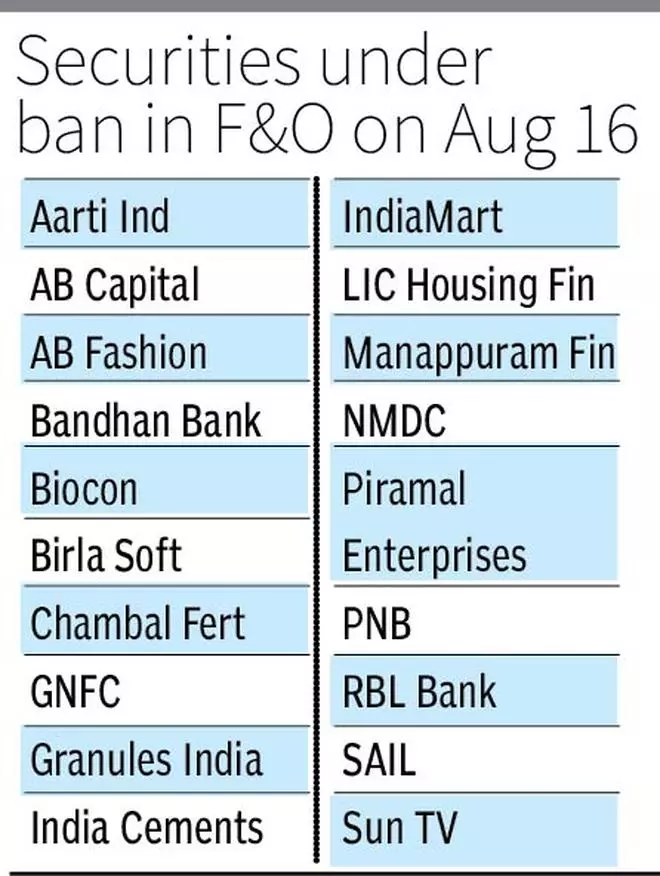Of late, the number of stocks coming under F&O trading ban on the National Stock Exchange has been on the rise and reaching unimaginable level. Currently, 19 stocks including India Cements, Manappuram Finance, Punjab National Bank, SAIL and Sun TV Network, are under trading ban. According to brokerages, if the current trend sustains, another dozen including IEX, BoB, Bata India, Hindustan Aeronautics, Vodafone Idea, IRCTC, Nalco, SBI Card and Hindustan Copper will enter the ban list soon.

A stock comes under trading ban if the total number of outstanding futures and options contracts for a stock exceeds 95 per cent of the Market-Wide Position Limit (MWPL).
MWPL is the lower of 30 times the average number of shares traded daily during the previous calendar month in the cash segment or 20 per cent of the number of shares held by non-promoters.
Currently, 181 stocks are available for trading in F&O segment.
Ringfencing investors
Until a few years ago, only two or three companies’ shares would typically come under a trading ban. However, over the past four years, that number has been increasing due to a sustained bullish market and a sharp rise in trading activity by retail investors. Stocks like SAIL, Chambal Fertilizers, and India Cements are frequently entering the ban list due to heightened speculative interest.
For example, the MWPL of Tata Motors is 35,66,18,780 (35.66 crore) shares. Currently, non-promoters or public holding in Tata Motors stands at 53.64 per cent or 178.30 crore shares and 20 per cent of 178.30 crore shares is 35.66 crore shares.
So, if overall open interests (both futures and options and on both NSE & BSE) reach 33.88 crore shares (95 per cent of 35.66 crore shares), exchanges will impose a trading ban on Tata Motors in the F&O segment.
Besides, if a stock experiences significant price fluctuations in a short period, exchanges might impose a ban to prevent further volatility and protect investor interests. Further, if an underlying security comes under trading suspension, exchanges will also impose a ban on its derivative contracts.
Exchanges disseminate the number of stocks coming under ban after market close, so that brokerages can disallow traders from buying those contracts on the subsequent days. Only existing position holders will be allowed trade on those contracts and that too to unwind their holdings.
As the retail participation is rising sharply, worried market regulator Securities and Exchange Board of India (SEBI) is already working on various measures to reduce their participation.
Suggeseted proposals
In fact, a recent consultation paper released by SEBI mooted several proposals to arrest speculative activity. For instance, it suggests that MWPL on a rolling basis should be between ₹1,250 crore and ₹1,750 crore against the current ₹500 crore; stock’s average daily delivery value in the cash market, in the previous six months on a rolling basis, should not be less than ₹30-40 crore (current ₹10 crore).
Another proposal is that stock’s median quarter sigma order size (an order required to cause a change in the stock price equal to one-quarter of a standard deviation) over the last six months, on a rolling basis, should not be less ₹75-₹100 lakh (currently ₹25 lakh); and at least 15 per cent of trading members active in all stock derivatives or 200 members, whichever is lower, shall have traded in any derivative contract on the stock. Trading on minimum 75 per cent of trading days; average daily turnover (premium basis) would be minimum ₹150 crore and average daily open interest would be a minimum between ₹500 crore and ₹1,500 crore.
Along with increase in lot sizes, the above proposals may rein in retail investors’ frenzy. Time has come to introduce them at the earliest before things go unmanageable level.




Comments
Comments have to be in English, and in full sentences. They cannot be abusive or personal. Please abide by our community guidelines for posting your comments.
We have migrated to a new commenting platform. If you are already a registered user of TheHindu Businessline and logged in, you may continue to engage with our articles. If you do not have an account please register and login to post comments. Users can access their older comments by logging into their accounts on Vuukle.